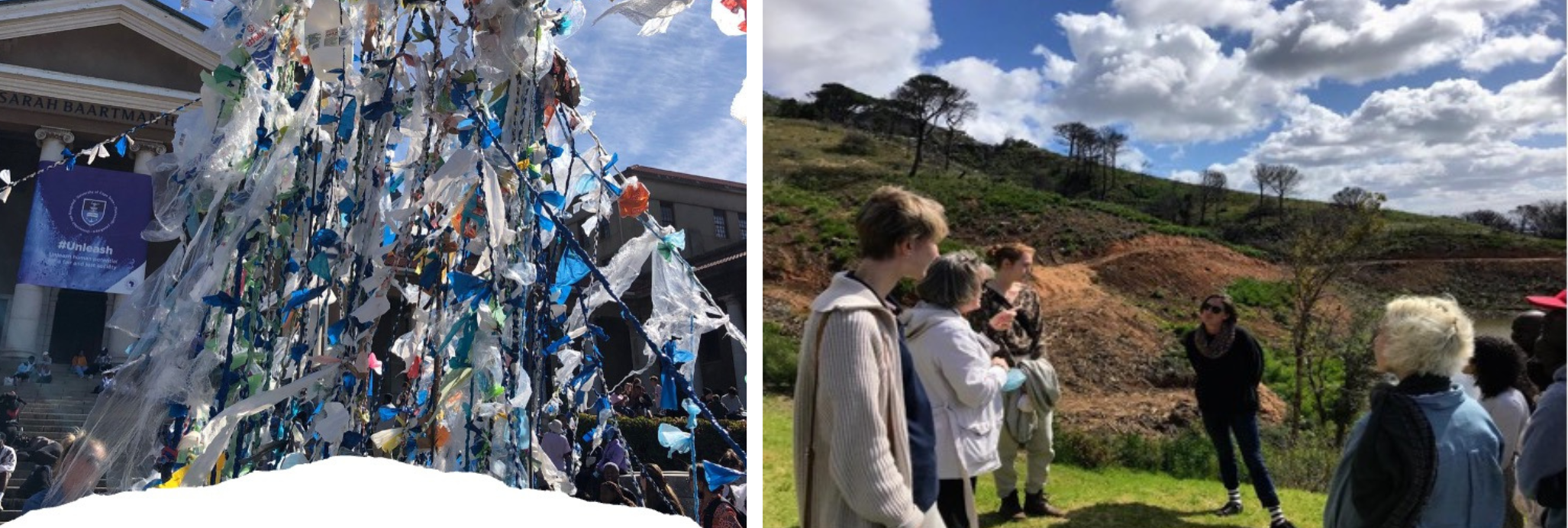
Background | Key Activities | Community Engagement | News & Outputs
UCT launched the Khusela Ikamva “secure the future” sustainable campus project in 2020, as part of its vision 2030 Agenda. Sustainability is a core concern of UCT’s Vision 2030. The aim of the project is to catalyse the transformation of UCT into a sustainable campus by establishing a community of practice informed by:
- leading research that incorporates UCT stakeholders from all spheres (students, academic and PASS staff)
- extensive and inclusive engagement with the university community
- exemplar Living Lab interventions on campus, that serve as a proof-of-concept
The project will consider environmental, financial and social impacts associated with five core themes in the UCT campus context, namely energy/carbon, water, waste, wildlife and social responsiveness. The project aims to support and build on UCT’s environmental sustainability strategy and will include research to determine the feasibility of particular elements. Certain solutions will be developed into a proof-of-concept to be tested on campus, in targeted areas on campus, through a Living Lab approach. The project will thereby become a key enabler to transform the institutional fabric of UCT to become a more sustainable campus, through not only the physical fabric of the campus but also through the social fabric which is the campus community.
The project focuses on these key themes, each with a dedicated research leader and team located in a UCT research institution, collaborating together:
- energy/carbon footprint – Harro von Blottnitz (ESRG)
- sustainable water – Kirsty Carden (Future Water)
- waste/energy/food nexus – Thanos Kotsiopoulos (CeBER)
- wildlife/waste/art nexus – Nicoli Nattrass (iCWild)
- establishing a community of practice/social responsiveness – Britta Rennkamp (ACDI)
The work is coordinated by the Director for Environmental Sustainability in the Office of the Vice-Chancellor, with support services from the Research Office, including a governance committee that will track the progress of the project over the course of this five-year project (2021 to 2026).

Key Activities
- Student engagements thus far have included; ACDI staff and student campus "walk and talk" with Future Water and Carbon Footprint, engagements with student groups concerned with sustainability (GCI, SRC) as well as engagements with Green Week hosted by GCI and other Student run societies.
-
ACDI hosted staff engagements, synergies and community of practice workshops. These included: Mapping of Actor networks & their influences on project goals, Living labs workshop, Green spaces workshop, Circular economy workshop and Community of Practice workshop
-
PV installations used as living labs on campus for both students and staff.
-
Carbon Footprint had installed some PVs on the roof top of chemical engineering building as part of energy efficiency in buildings. Furthermore, solar PV Carport have been installed at North stop. First hardware was donated (TRAJECTS from DAAD).
-
- Blue green infrastructure
-
Future Water is exploring ways to incorporate Water Sensitive Design (#WSD) principles and Sustainable Drainage Systems (#SuDS) into UCT’s water management strategy. They also aim to establish blue green infrastructure on campus. Examples of blue green include green roofs, retention and detention of ponds, storm water harvesting, and rain gardens.
-
-
Waste management activities through CEBER, including: the digestion of food waste to produce energy (Biogas), manufacture organic waste to fertiliser, planting vegetation for cooling (Green building) and establishing vegetable gardens
- Highlighting the Waste-Poison-Wildlife nexus which has four main strands:
- art, which remains a fluid section depending on inspiration and activities of students,
- recycling,
- integrated pest management,
- and wildlife research

Community of Practice Engagement
ACDI organised a series of Intergovernmental Panel on Climate Change (IPCC) webinars as part of its community of practice engagement with the wider UCT community. UCT, through its researchers and students, is well-known for making important contributions to the global body of knowledge on climate change. Furthermore, UCT has the largest number of contributing authors in the IPCC reports. Therefore, the purpose of these webinar series was to explain the authors’ research findings and how it relates to UCT, across all campuses. These were scheduled for the 3rd, 7th, and 22nd of November.